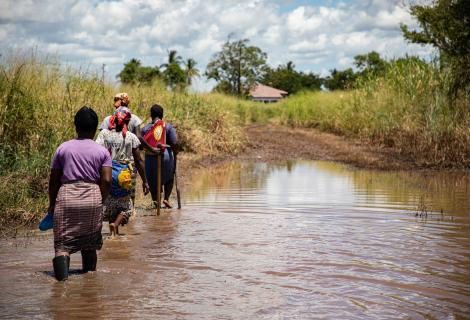
EU should adopt a human rights-based approach to migrants forced out of their countries by the climate crisis, ActionAid says
The European Union needs to strengthen protection policies for people moving in response to disasters, climate change, and environmental degradation, ActionAid has said.
In a recent study, ActionAid analyses the relationship between climate and international migration, revealing how European migration policies are mainly based on deterrence and the externalisation of borders. The report shows that the EU does not recognize the need to guarantee greater protection to migrants escaping countries that have become unlivable.
The report titled,“Climate Change Knows no Borders - Addressing Protection Gaps and Enhancing Policy Responses to Climate Mobility featuring In-Depth Research from The Gambia”, highlights how the climate crisis is one of the factors of vulnerability that influences the migratory decisions of millions of people affected especially from Africa.
"The effects of climate change are being felt all over the world, but most severely in the global South where millions of people are being forced to flee their homes. There is a moral obligation for the EU - one of the biggest emitters of greenhouse gases - to address the growing crisis of climate migration," said Javier Garcia, the Head of EU Office and Engagement at ActionAid International.
"The bloc must take a leadership role in addressing this crisis by incorporating migration considerations into its climate policies and establishing effective protection mechanisms. By acting now, and finding innovative solutions, the EU can help to ensure a more just and equitable future for all."
For instance, the report shows how the climate crisis has worsened existing hardships for communities in The Gambia where ActionAid conducted case studies on climate migration. The country has a staggering 8% of the population living in the diaspora.
“Many people are blaming climate change for our poverty and that is a huge cause for migration,” said a 30-year-old male resident of Kanifing Municipality in the Greater Banjul Area.
Another Gambian based in the Central River Region said, “Climate change makes everything difficult. Farming is so bad now that most people have stopped farming and moved to the Kombos (urban areas).”
The report shows how existing inequalities and power dynamics play a decisive role in the outcome of the migration path, influencing its destination, duration, and conditions.
Roberto Sensi, the Policy Advisor on Global Inequality at ActionAid Italy said:
“When it comes to the impacts of the climate crisis, women carry the biggest burden due to their caregiving role in the community. To protect women forced to leave their country due to the hardships caused by the climate crisis, the EU must go beyond deterring movement and review their migration policies.”
The increased risks associated with climate change are already reshaping human mobility. By the end of 2022, the global number of internally displaced people (IDP) due to extreme environmental events stood at 32.6 million, constituting 53% of the total (71.1 million), with 98% attributed to floods, storms and droughts.
Contact the ActionAid press office on media-enquiries@actionaid.org or on +263776665065.